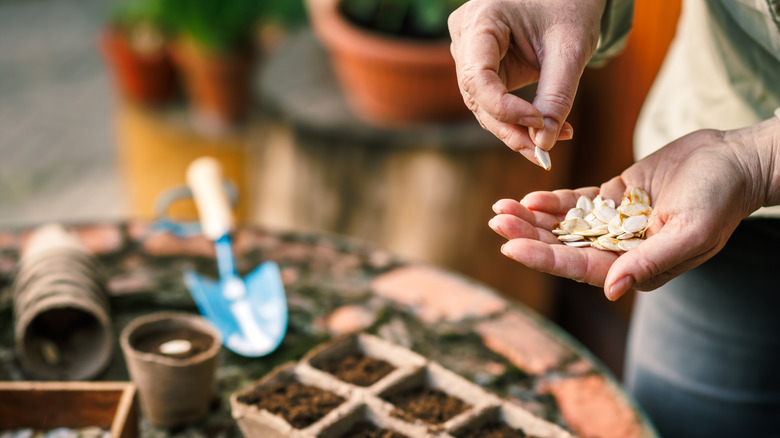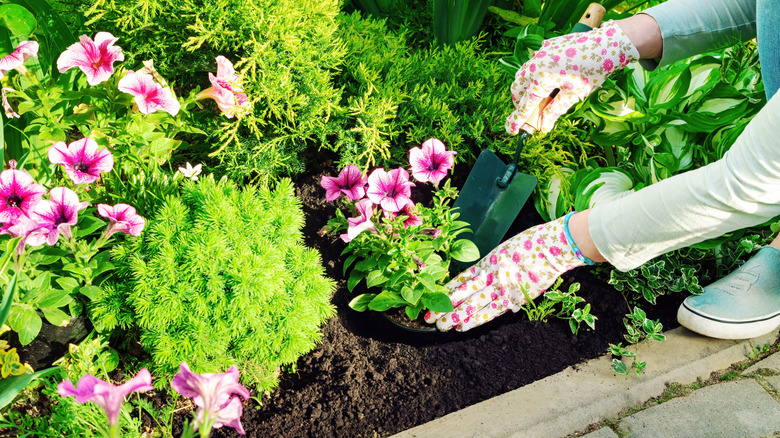The Simple Yet Genius Trick That Will Help Your Large Seeds Germinate Faster
Growing a healthy garden takes hard work and patience. But while gardeners are happy to put in the sweat equity, waiting for the fruits of their labor isn't always as gratifying. As a general rule, you shouldn't rush nature's work — but if you've ever planted seeds like sweet peas or nasturtiums, to name a few, you may have noticed they take forever to sprout — if they sprout at all. That's because large seeds with hard outer shells are built to survive tough conditions and won't germinate until nature softens them up. Fortunately, you can speed up the process by snipping off the tip of the seed. Called scarification, this simple gardening trick jump-starts germination and gives your seedlings a head start.
This isn't just about impatience, though. Scarification helps you maximize the growing season, which is especially helpful for seeds that would otherwise lie dormant through winter. They'll open on their own eventually, but waiting too long means you might miss your window of growing opportunity. Snipping is one of the easiest methods, but scarification can also be done by soaking, sanding, or gently nicking the seed coat. It all depends on the type of seed you're looking to germinate faster.
How to scarify seeds (and why it works so well)
Scarification is most useful for seeds with hard, water-resistant coats — the kind that evolved to survive in harsh environments. These include morning glories, sweet peas, nasturtiums, milkweed, bluebonnets, and some beans, gourds, and okra. If you've had trouble getting these to sprout, a little prep can go a long way. The idea is to break through the tough outer shell that keeps water and oxygen out — two essentials for germination. In nature, seeds with hard coats wait for weather, microbes, or animal activity to wear them down. But in the garden, especially when you're racing against a short season, a little intervention helps move things along. One of the simplest ways to do this is with a pair of scissors. Tip-nipping involves carefully snipping off just the pointed end of the seed coat — enough to expose the inner layer without damaging the embryo inside.
This allows moisture to soak in more quickly and gives your seeds a strong head start. Other scarification methods include using sandpaper to speed up seed germination time by gently rubbing the seed coat, swirling them inside a sandpaper-lined container, or soaking them in warm water to soften the outer shell. No matter which approach you take, the aim is to make it easier for moisture and air to reach the embryo, encouraging the seed to wake up and grow. After nicking or snipping, it's a good idea to soak your seeds for a few hours or even overnight to further encourage water absorption. Once soaked, make sure you plant them right away — scarified seeds don't store well and can quickly lose their will to live if left unused.
When to scarify (and when to leave it to nature)
It's important to note that scarification isn't appropriate for all seeds. Vegetable plants and most annual flowers already have thin, permeable seed coats that naturally take in water. Trying to scarify them can do more harm than good. If you do want to get a head start on your veggie garden, you can always use a cotton ball hack to germinate seeds indoors. This approach offers seeds a warm, moist environment to sprout in when it's still cold out. Then, once the warmer weather arrives, nature can take over.
On the flip side, there are times when scarification is definitely worth doing. Seeds with low germination rates — or those that are hard to come by — will benefit from a little human assistance to improve the odds of sprouting. And when every seed counts and time is of the essence, this relatively small step that can make all the difference. However, before you reach for those scissors, make sure you first check your seed packet to see whether scarification is even needed. Knowing when to lend a hand and when to step back is part of becoming a skilled gardener.

